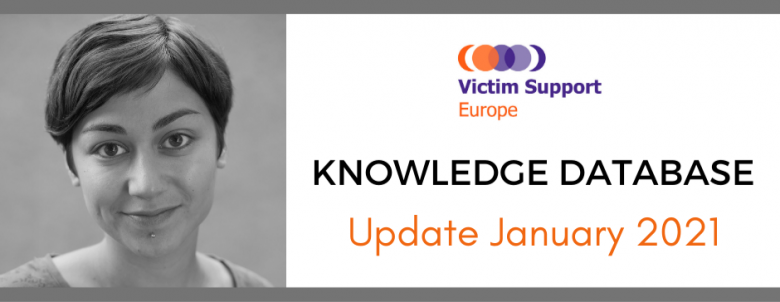
Knowledge Database – January 2021 Update
This is a monthly update from our Knowledge Database editor Sasha Boychenko. If you would like to submit publications to the Database, please reach out at vse@victimsupporteurope.eu
Happy New Year and welcome to the first update on VSE’s Knowledge Database of 2021! This month we are also celebrating Data Protection Day, so January’s additions to the database are all about data protection.
On 26 April 2006, the Council of Europe decided to launch a Data Protection Day to be celebrated each year on 28 January, the date on which the Council of Europe’s data protection convention, known as “Convention 108”, was opened for signature. Data Protection Day is now celebrated globally and is called Privacy Day outside Europe. Within the European Union, special attention is now paid to the GDPR since its implementation in 2018.
This month’s publications on data protection will be useful for our members in various areas of their work. Specifically, many of the publications offer practical advice and theoretical considerations relevant specifically to NGOs and other civil society organisations.
These flowcharts and checklists on data protection put together by the European Data Protection Supervisor (EDPS) will help you understand whether your organisation is a processor, a controller, or a joint controller, according to GDPR, and what your duties are. This guide for charities and non-governmental organisations offers a lot of practical tips on steps to take in order to make your NGO GDPR-compliant.
Additionally, this report on civil society organisations and GDPR compliance offers a unique perspective on GDPR from the point of view of NGOs specifically, and provides practical, relevant guidance for NGOs as well as thoughtful reflections on common compliance issues. Finally, a journal article titled “Data to the rescue: how humanitarian aid NGOs should collect information based on the GDPR” explores the importance of the implementation of the guiding principles of the GDPR, the legal bases for data processing, data subjects’ rights, and data sharing during the provision of humanitarian assistance.
Artificial Intelligence is one of the fastest-growing industries in the world. It is also an industry inevitably intertwined with data protection concerns. The Fundamental Rights Agency (FRA) explores this topic in its report titled “Getting the Future Right: Artificial Intelligence and Fundamental Rights” and also provides a useful brochure on the main considerations arising on the intersection between fundamental human rights and AI.
Also by FRA: The Fundamental Rights Survey which provides, for the first time, a comprehensive set of comparable data on people’s experiences and opinions concerning their fundamental rights. The survey focuses on everyday situations in areas including data protection, equal treatment, access to justice, consumer rights, crime victimisation, good administration and the importance of protecting rights.
Finally, you can now also find in our database a short guide to two of the more complex concepts referred to in GDPR: necessity and proportionality. The guide is produced by EDPS and offers eight steps which should help organisations assess the necessity and proportionality of the data they collect.
We hope you enjoy this month’s publications – and if your organisation has produced a publication on data protection, please do share it with us!
- Flowcharts and Checklists on Data Protection
- Data Protection: a guide for charities and non-governmental organisations
- Civil Society Organizations and General Data Protection Regulation Compliance
- Data to the rescue: how humanitarian aid NGOs should collect information based on the GDPR
- Getting the Future Right: Artificial Intelligence and Fundamental Rights
- Your Rights Matter: Data Protection and Privacy
- The EDPS quick-guide to necessity and proportionality
